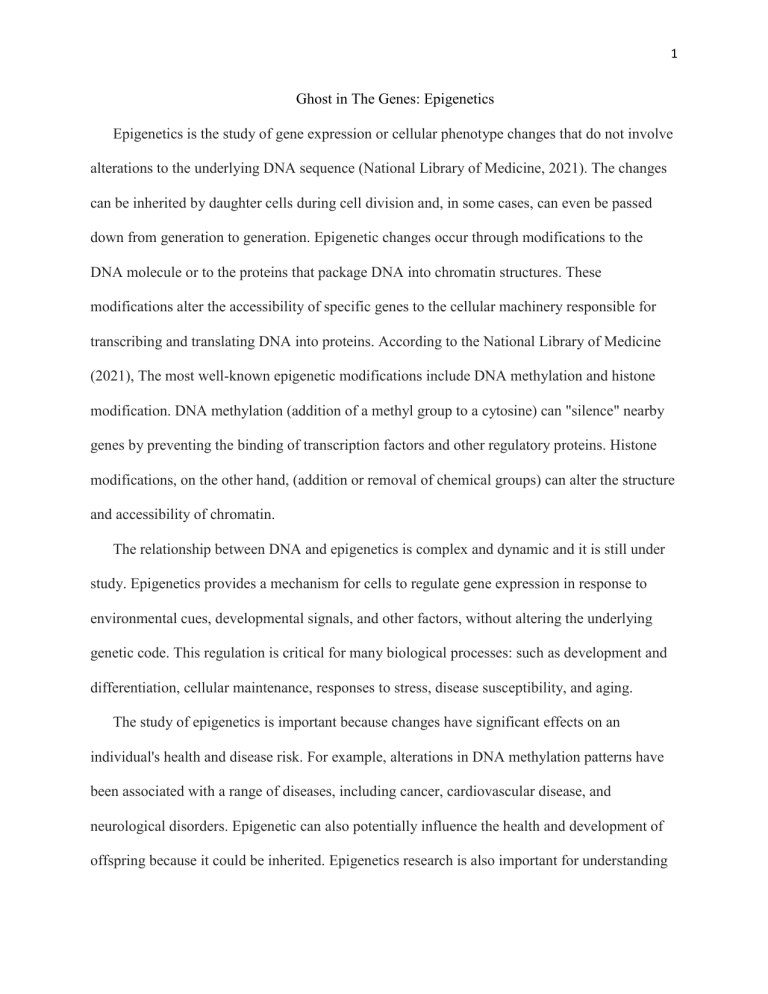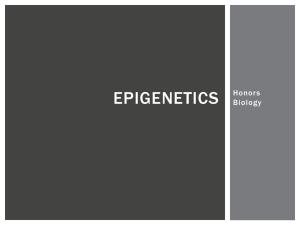
1 Ghost in The Genes: Epigenetics Epigenetics is the study of gene expression or cellular phenotype changes that do not involve alterations to the underlying DNA sequence (National Library of Medicine, 2021). The changes can be inherited by daughter cells during cell division and, in some cases, can even be passed down from generation to generation. Epigenetic changes occur through modifications to the DNA molecule or to the proteins that package DNA into chromatin structures. These modifications alter the accessibility of specific genes to the cellular machinery responsible for transcribing and translating DNA into proteins. According to the National Library of Medicine (2021), The most well-known epigenetic modifications include DNA methylation and histone modification. DNA methylation (addition of a methyl group to a cytosine) can "silence" nearby genes by preventing the binding of transcription factors and other regulatory proteins. Histone modifications, on the other hand, (addition or removal of chemical groups) can alter the structure and accessibility of chromatin. The relationship between DNA and epigenetics is complex and dynamic and it is still under study. Epigenetics provides a mechanism for cells to regulate gene expression in response to environmental cues, developmental signals, and other factors, without altering the underlying genetic code. This regulation is critical for many biological processes: such as development and differentiation, cellular maintenance, responses to stress, disease susceptibility, and aging. The study of epigenetics is important because changes have significant effects on an individual's health and disease risk. For example, alterations in DNA methylation patterns have been associated with a range of diseases, including cancer, cardiovascular disease, and neurological disorders. Epigenetic can also potentially influence the health and development of offspring because it could be inherited. Epigenetics research is also important for understanding 2 the complex interplay between genetic and environmental factors in shaping an individual's traits and disease risk. I find the concept of epigenetics fascinating. This new information has been like an eyeopener about how environmental factors play a determining role in the expression of genetic material. I studied the composition of cells and how DNA strands are compacted to form chromosomes. Each chromosome has a certain number of genes that determine the phenotypic characteristics of a person inherited from both the mother and the father. However, the genes that we receive, and supposed to mark all our phenotype and traits are not set on stone, because epigenetics is other “coding” layer that eventually can determine many of our traits and develop many diseases. For that reason, by studying epigenetic changes in response to environmental exposures or lifestyle factors, researchers can find the factors that contribute to disease risk and potentially identify new therapeutic interventions. 3 References Frans Cronje. (2023, March 29). Ghost in the Genes. Vimeo. https://vimeo.com/179554321 National Library of Medicine. (2021, June 11). What is epigenetics?: MedlinePlus Genetics. Medlineplus.gov. https://medlineplus.gov/genetics/understanding/howgeneswork/epigenome/

